I cannot say it enough: getting your thyroid tested is critical. That’s why I have put together the definitive guide to testing, understanding, and interpreting your thyroid results. If you are worried about thyroid disease, even a little, let me walk you through everything you need to know to get started on getting a handle on thyroid testing today.
- Have any questions?
- 480-631-7837
- support@in-goodhealth.com

The New Chocolate Reset Shake
October 28, 2019
Podcast – Do Pro Athletes Burn Carbs or Fats? with Matt Fitzgerald
November 11, 2019
The New Chocolate Reset Shake
October 28, 2019
Podcast – Do Pro Athletes Burn Carbs or Fats? with Matt Fitzgerald
November 11, 2019Product Recommendation: The Daily Reset Bundle. All your Daily Thyroid Nutrients in a one stop bundle. Doctor Formulated, Thyroid Focused nutraceuticals that not only help boost your thyroid output but also assists in maintaining a thriving thyroid. This bundle contains ALL your essential micronutrients, healthy omega fatty acids, Vitamin D, Calcium and Magnesium. Specifically designed for those with Hashimoto’s, Hypothyroid and Hyperthyroid Disease. Click Here

Thyroid Testing 101
Your thyroid plays a critical role in your overall health, and more and more people are coming to realize it. Whether it’s for your energy, mood, weight, or to prevent the onset of chronic diseases.
Testing is important because it gives you a sense of where your thyroid health is at. After all, if you don’t know, how can you be sure you are doing the right thing? It’s not always clear who has thyroid disease and who does not. Testing grants us a foundational understanding of where you stand with risk (and with treatment).
When it comes to thyroid ranges, I think it is always important to distinguish between “normal” and “optimal”. When we think about testing, it is not an automatic process – it comes down to who is reading and analyzing your tests:
- Normal – Classifying your thyroid as “normal” does not always mean that your health is where it needs to be. It just means that it is meeting the expectations of acceptability.
- Optimal – We should be aiming for “optimal”. Which is always where your thyroid health should be (it is also a narrower definition). We will continue with this in mind.

What Is Your Thyroid?
Your thyroid is a butterfly-shaped gland that sits beneath the adams apple. On a very basic level, it makes hormones that govern metabolism.
One of the main things that the thyroid does is that it absorbs iodine. We get iodine from our diets, and iodine is created in our bloodstream. The thyroid takes that iodine and turns it into a concentrated form. This reaction creates hormones.
Key Insight: When we think of terms like “T4” and “T3” that is the number of iodine that is involved in the thyroid’s production process.
Once these hormones are created, they are released into the bloodstream. This is the part where they are secreted in order to perform various jobs all throughout the body. This is going to mainly consist of T4, but we might also see some T3 and T2 in there as well.
These hormones are activated by thyroid-stimulating hormone (otherwise known as TSH – which we are going to be talking a lot about as we move forward).
There is also something called “peripheral activation” in thyroid hormones. This is where T4 is broken down into T3 and T2 by the organs in the cells.
Thyroid Diseases Understood
Now that we know just how important our thyroid is, we can begin to understand the importance of managing any thyroid diseases.
When it comes to thyroid diseases, we need to look at two distinct problems that can occur in the thyroid:
- Hypothyroidism (Hashimoto’s Disease) – an underactive thyroid gland
- Hyperthyroidism (Grave’s Disease) – an overactive thyroid gland
While we might consistently attribute thyroid problems to both of these diseases, we also need to briefly consider the fact that these problems may be born from medications.
Someone who is taking thyroid medications that are not helping their body might also be suffering from an underactive – or an overactive – thyroid gland.
Bottom Line: Whether we are considering an underactive thyroid gland, an overactive thyroid gland or mismanagement of thyroid medications, we know how important our thyroid is and how we can take care of it – by testing it!
Different Thyroid Test Categories
Thyroid testing begins with blood tests. Let’s go through the most typical ones, which will help us establish a baseline for thyroid health:
TSH/hs-TSH

In almost all circumstances, this is the test being used. There are some different schools of thought on this subject, but I think it is best that we understand that this test is important, but it’s not the be-all and end-all for our thyroid health.
Overall, this test is an opportunity to understand how much work the pituitary gland in our brain is asking from our TSH. When the pituitary is working properly, this number is backward. This means that when it is high the thyroid is underactive, and when it is low, the thyroid is overactive.
According to most labs, the normal range is 0.4 – 4.51. This large testing range explains why analyzing these scores requires a great deal of finesse and thought.
It is also why diagnosing for treatment is so critical. A range like this is far too broad, so we need to have other tests help us define what is optimal – rather than what is simply going to be considered normal.
Free T3 & Free T4
This is where we need to create a distinction between the two types of hormones:
- Free Hormones – those which are free and active from carrier proteins.
- Total Hormones – those which are present, but not active.
Free hormones are going to be more important, because they give us a better idea of the active (and effective) hormones in our blood stream. This test is going to give us a sense of three things:
- How much is being released
- How much is circulating
- How much is being converted (T4 to T3)
Thyroglobulin
Thyroglobulin is a protein that is innate to the thyroid. This test is going to give us a sense of whether or not there is a risk for any inflammation in the thyroid.
Thyroid Antibodies
There are two types of thyroid antibodies:
- Anti-thyroglobulin – an attack on the thyroglobulin, which is a common aspect of Hashimoto’s disease.
- Anti-thyroperoxidase – an enzyme involved with hormone production.
Key Insight: Thyroid antibodies are not always there, and they can be very erratic (in ways that are not meaningful for our bodies).
Thyroid Stimulating Immunoglobulin (TSI)
Also known as thyroid receptor-binding protein, this is a test that is a good indication of Grave’s activity.
This is typically one of the first tests done for diagnosis, and it could also speak to a combination of Hashimoto’s and Grave’s disease – which is quite possible. It is also indicative of Grave’s eye disease2.
Reverse T3
As we already know, T3 is the active thyroid hormone. When our body makes T3, it makes two versions:
- T3
- Reverse T3
Think of it like your right hand and your left hand, reverse T3 is the mirror opposite of T3 in your body.
Reverse T3 is inactive, the main thing that you make out of T4 – because of the surplus. When it is too high, your body is stowing it – or you are taking too much thyroid hormone.
Key Insight: When there is something wrong with your reverse T3 test, it is typically because something is happening. Sorting out why there is so much, and managing those factors, is going to be critical to your health.
Less Common Tests
These are just some of the other tests we might see, but they are not as important and you are less likely to see them. It’s sometimes good to be familiar though, even if you never end up encountering them:
- T7
- T3 RIA
- T3 Uptake
Structural Evaluations
For your thyroid health, you also need to have a good sense of structural evaluations.
This is going to be understanding the physical mass, size and health of your thyroid.
You can screen for this in three separate ways:

- Ultrasound – Please get an ultrasound. It is important, especially because of instances of thyroid cancer3. Get yourself screened a couple of times a year. There is no radiation, so it is completely harmless – and very helpful.
- Self-Exams – Drink some water, look in the mirror and learn to feel the structure of your thyroid. Know what’s normal, and when something feels wrong. Once you know normal, you’re definitely going to know if something is amiss.
- Doctor’s Exam – This is a good part of a yearly physical.

Discovering Root Causes
At the first stage of diagnosis, it is important to understand what gave rise to thyroid problems in the first place. Functional medical tests are available to help understand why someone is developing thyroid disease in the first place.
By testing the root causes, you can understand what steps will help your immune system and give you the best chance of reversing thyroid disease.
These are just some of the tests we should be considering:
- Food intolerances
- Toxicology
- Chronic infections and gastrointestinal function
- Nutrient deficiency
- Adrenal dysfunction (daily circadian rhythm)
- Diabetes and blood sugar problems
- Genetic variations
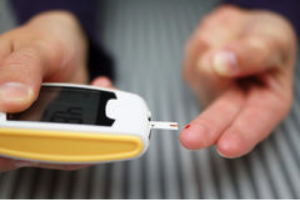
Bottom Line: Test, don’t guess! Find out your own personal needs, address them and resolve them so that you know you are getting exactly what your body needs.
Interpreting Your Results and Your Optimal Ranges
TSH
Ultimately, you want to see this at the lower end of the normal range. But not below it (0.5 to 1.5 is my personal favorite).
If someone does have any structural problems, then something narrower might be in order (0.5 to 0.9).
Free Hormones (Free T3 and T4 Tests)
Some authors argue that they should be at the high end of the normal range, I argue that you may not need to be in the high end of the range.
Studies comparing people without thyroid disease to those with it do not find that healthy people free of thyroid disease have higher levels of free hormones. In many cases, taking thyroid medication can cause hormones to be higher when the TSH is suppressed (which can be a danger).
Thyroid Antibodies
Normal ranges exist for this test, but the optimal that we want to consider is zero. There is a high rate for false positives with this type of test, and more than 40% of those who have Hashimoto’s do not have positive antibodies4.
Reverse T3
As we know, most of the T4 that the body produces is intentionally made into reverse T3. When reverse T3 is too high, the most common cause by far is hyperthyroidism.
This can either be from someone making too much or taking too high of a dosage. This is not something I track on an ongoing basis, as it is usually something worth screening in the beginning.
Bottom Line: It is not practical to test everything, all of the time, so we need to be aware of schedules and frequencies. This way we know enough about our bodies, but we’re not breaking the bank and constantly testing.
Why Is Testing Your Thyroid Important?
There are three types of testing that I want to focus on, which are:
1. Testing For Diagnosis
This is going to cover all of the tests that I previously mentioned (a full thyroid panel). This way you can really see your baseline levels (and where you stand with your thyroid functions).
2. Testing for Dosage
Is your medication working well, is it the right type, and how can we best explain your symptoms?
3. Testing for Safety
Even if you are feeling fine, it is important to keep your thyroid levels in a healthy, narrow range. Just like blood sugar, blood cholesterol, or blood pressure, thyroid levels show predictive value on long-term health outcomes.
If your thyroid level suggests you are getting too much thyroid, these raise the risk for:
- Early death
- Bone fracture
- Brain aging
- Heart disease
On the other hand, if your levels show you are getting too little thyroid this can even raise the risk for thyroid cancer, fatty liver, melanoma, diabetes, and other problems.
What Time of Day Do You Test?
Make sure that you do your blood tests first thing in the morning, before eating, and before taking your thyroid medication. You will want to take your daily dose of medication immediately after your tests.
Common Issues with Thyroid Testing
These are some of the common issues we might encounter when testing our thyroid gland:
- T3 Too High – if everything else is normal, this is usually from taking thyroid medication before your blood test (rather than after).
- TSH Too Low – It is a risk factor, and so it’s worth understanding. If you only feel well when your TSH is too low, there is some other hidden cause that has not been identified.
- Erratic Antibody Levels – thyroid antibodies are good to confirm a diagnosis, but they don’t rule it out when they are negative. They may be culprits behind infertility or anxiety (6). Otherwise, changes in them do not likely affect your health. They can go up and down randomly.
- TSH Drift – Your TSH takes about 3 months to level out after some change in thyroid treatment or lifestyle. If you wish to see it lower, and it is moving down within less than 3 months, your efforts may be working. Give more time before taking further steps.
How Should You Do Your Test?
This may be one of the most important points of the article, so please read over these guidelines closely.
I found that, in many cases of fluctuating or erratic thyroid levels, the problem comes down to the patient not being told to test in a way that will yield consistent results.
Here are some surefire steps to ensure that you are getting consistent results:
1. Test in the Morning
Your thyroid levels follow a circadian rhythm, just like cortisol or other hormones in the body.
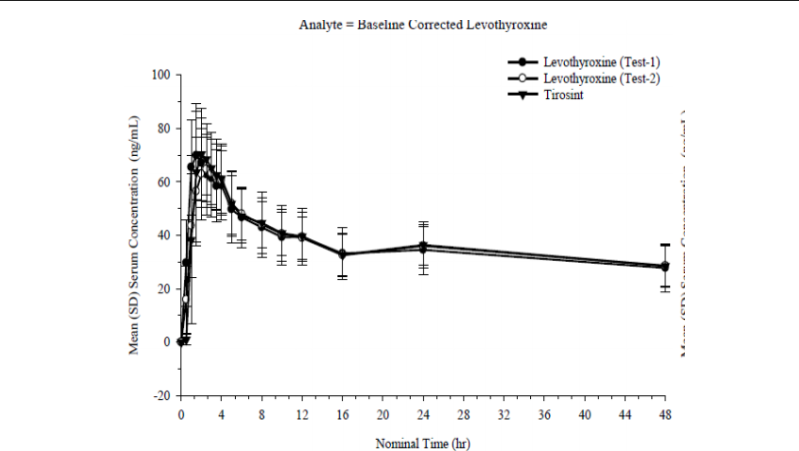
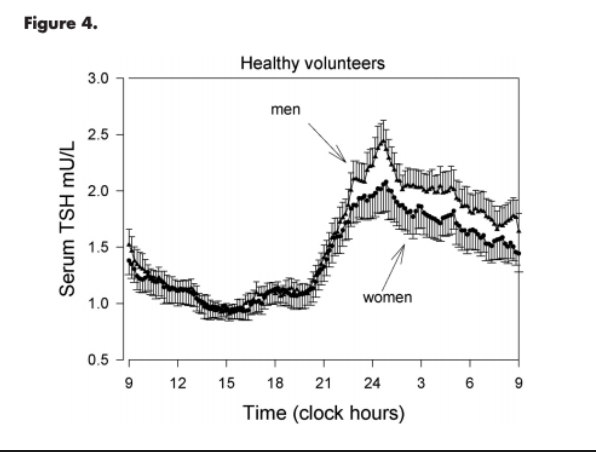
If you compare morning levels to noon or afternoon levels, you will see differences that are not meaningful and only reflect the body’s own fluctuations.
2. Test Before Taking Your Thyroid Medication
When you test after taking the pill, your levels of T3 and T4 can be highly erratic for the following 1-10 hours. It is impossible to know if your levels are too high or too low because there’s so much possible variation.
TSH does not change as much with, as free hormones will be hard to read. The best protocol to yield consistent results is to always take your test first thing in the morning (right before you take your thyroid medicine).
For those taking medication with T3, doctors may choose to test after the dose if they’re trying to troubleshoot hyperthyroid side effects. But this is not an accurate way to test to see if the dose is appropriate, just to see if it’s causing side effects.
Even with T3 medications, they still show up in the blood 24 hours after taking and are still best tested for before taking the pill.
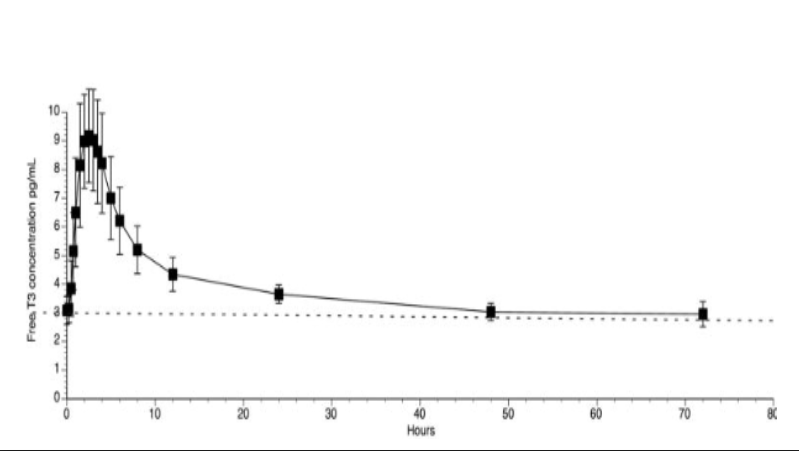
3. Do Not Test Between Days 10-20 of your Menstrual Cycle
If you are a man, a menopausal woman, or a woman with irregular menstrual cycles this will not apply to you.
If you do have your period regularly, you produce high amounts of thyroid-binding globulin between days 10-20 of your menstrual cycle.
This can change your thyroid hormone scores by 50 to 75%. All too often, I will see women you have tests done at one point one cycle and at a different point of another cycle.
Any differences between these readings may not be from differences in how the treatment is working or how the person is responding to treatment. The difference may only be from the fact that different parts of the cycle were tested.
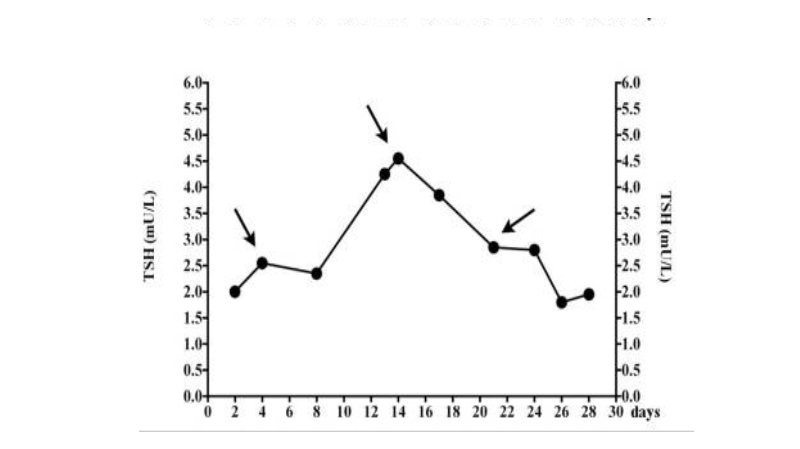
4. When you aren’t using supplements
Test when you AREN’T using any supplements with biotin for at least 3 Day PRIOR to your test.
5. When you are fasting
Test when you are FASTING. No coffee, no breakfast, etc. before your thyroid test. Water is okay.

When Should I Test?
Here are some steps to give you a good idea of when to test:
1. Start With A Full Panel For Clear Diagnosis
The Initial Full Thyroid Screen includes testing TSH, Free T4, Free T3, antibodies, Comprehensive Metabolic Panel, CBC Panel, Serum Ferritin, Iron and TIBC and ANA with reflex
2. After Treatment Has Started…
Retest TSH and free hormones to see if treatment needs to be adjusted. Also retest antibodies if they were extremely elevated (over 1000) and possibly contributing to symptoms (infertility, anxiety).
The Full Thyroid Retest panel includes TSH, Free T4, Free T3, Antithyroid Peroxidase and Antithyroglobulin antibodies
3. After Your Body Has Reached A Steady State…
Retest TSH, free hormones, (and optional antibodies) in 3 months. The Dose Adjustment Test screens your TSH, Free T4, and Free T3
4. When You Are Feeling Well…
Pretest TSH, free hormones, (and optional antibodies) every 6 months to be sure things are stable.
Bottom Line: You may also enjoy tests approximately four weeks after dosage changes. As well, any time that you have unusual symptoms where you think your thyroid might be the culprit – this is going to circle back to the importance of self-exams and your thyroid health!
Do You Need Your Thyroid Tested?
We would love to help. The first step is to get tested. In fact, we have partnered with Your Lab Work to give you access to the tests that I recommend.
You can do these tests without a doctor’s order (in most US states). They are analyzed through the Quest Diagnostic Laboratory system.
This is the top-quality analytic lab I use in our clinic. The cost of these tests through Your Lab Work is often 80% less than what you would pay on your own.
Usually the same or lower than the cost of cut-rate labs for accurate data. You can click here to see your labs right now.
Start Getting Help
Once you get your results, what do you do with them? The doctors at Integrative Health are able to help you and manage all facets of your thyroid care via telemedicine.
Click here to set up a visit now.
Most lab results from Your Lab Work take 2-3 days. If you schedule a visit with a doctor for 1-2 weeks out and do your labs, you should have your results in time to share with your IH doctor.

1 – https://thyroidresearchjournal.biomedcentral.com/articles/10.1186/1756-6614-8-S1-A17
2 – https://www.ncbi.nlm.nih.gov/pmc/articles/PMC3474632/
3 – https://theoncologist.alphamedpress.org/content/15/3/253.full
4 – https://journals.plos.org/plosmedicine/article?id=10.1371/journal.pmed.0020089

P.S. Whenever you are ready, here is how I can help you now:
- Schedule a Thyroid Second Opinion with me, Dr. C, Click Here for Details
- Need help to choose supplements? Click ‘Help Me Decide Here'
- Get my top books Here
Dr. Alan Glen Christianson (Dr. C) is a Naturopathic Endocrinologist and the author of The NY Times bestselling Hormone Healing Cookbook, The Metabolism Reset Diet, and The Thyroid Reset Diet.
Dr. C’s gift for figuring out what works has helped hundreds of thousands reverse thyroid disease, heal their adrenals, and lose weight naturally. Learn more about the surprising story that started his quest.






